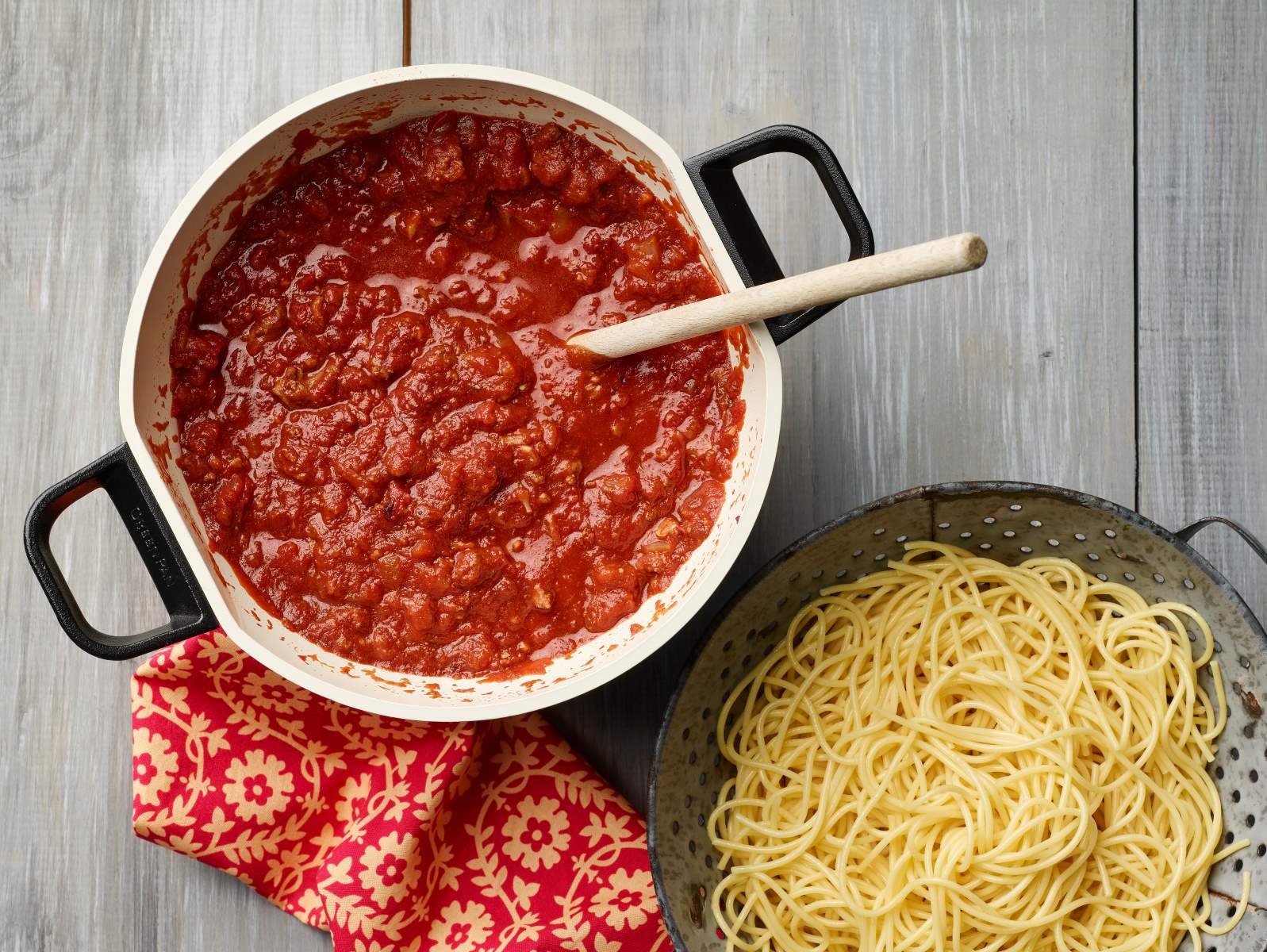
Pasta sauce is a versatile and delicious addition to any dish. Whether you’re a fan of classic marinara, creamy Alfredo, or spicy arrabbiata, pasta sauce adds flavor and depth to your favorite noodles. But besides being tasty, pasta sauce also has nutritional value that is worth exploring.
In this article, we will dive into the nutritional facts of pasta sauce and highlight 20 key points to keep in mind while enjoying this culinary delight. From the calories and carbohydrates to the vitamins and minerals, we’ll uncover how pasta sauce can contribute to a balanced and healthy diet. So, if you’re curious about what’s in that jar of sauce, keep reading to discover the nutritional goodness that awaits!
Key Takeaways:
- Choose pasta sauce based on your dietary needs and preferences, considering factors like calories, fat, sodium, and sugar content. Look for options with added protein, fiber, vitamins, and minerals to enhance nutritional value.
- Explore a variety of pasta sauce options, including gluten-free, organic, vegan-friendly, low-sugar, high-fiber, reduced sodium, all-natural, spicy, low-calorie, rich and creamy, and versatile flavors. Make informed decisions to elevate your pasta dishes.
Calories
The calorie content of pasta sauce can range from around 50 to 100 calories per serving, depending on the brand and variety.
Fat
Pasta sauces can contain varying amounts of fat, with some low-fat options available for those watching their fat intake.
Sodium
Sodium levels in pasta sauce can vary greatly, so it’s important to check labels if you’re watching your sodium intake.
Sugar
Some pasta sauces contain added sugars, so be mindful of this when selecting your sauce.
Protein
Pasta sauce typically contains a small amount of protein, usually around 1-2 grams per serving.
Carbohydrates
Carbohydrate content can vary depending on the type of pasta sauce, with some options being lower in carbs than others.
Fiber
Some pasta sauces may contain fiber if they are made with vegetables or whole ingredients.
Vitamins
Pasta sauces can provide small amounts of vitamins such as vitamin C, vitamin A, and various B vitamins.
Minerals
Minerals like potassium and iron can be found in small quantities in certain pasta sauces.
Gluten-Free Options
There are gluten-free pasta sauces available for those with gluten sensitivities or celiac disease.
Organic Varieties
Organic pasta sauces are made with ingredients that are grown without the use of synthetic pesticides or fertilizers.
Vegan-Friendly Choices
There are pasta sauces that are specifically formulated without any animal products, making them suitable for vegans.
Low-Sugar Alternatives
Some pasta sauces are sweetened with alternative sweeteners or have less added sugar, making them a better choice for those watching their sugar intake.
High-Fiber Options
For those looking to increase their fiber intake, there are pasta sauces that are made with fiber-rich ingredients like beans or lentils.
Reduced Sodium
If you’re concerned about your sodium intake, there are pasta sauces available with reduced sodium levels.
All-Natural Ingredients
Some pasta sauces are made with all-natural ingredients, free of artificial flavors, colors, and preservatives.
Spicy Varieties
For those who enjoy a kick of heat, there are pasta sauces available with added spices or chili peppers.
Low-Calorie Options
If you’re watching your calorie intake, there are pasta sauces available that are lower in calories.
Rich and Creamy Sauces
Indulge in the creamy goodness of pasta sauces that have a rich and velvety texture.
Versatile Flavors
Pasta sauces come in a variety of flavors, from classic marinara to bold arrabiata, allowing you to experiment with different tastes.
With these 20 pasta sauce nutritional facts, you can now make informed decisions about the pasta sauce you choose to incorporate into your meals. Remember to read labels and consider your dietary needs and preferences. Enjoy your pasta dishes with the perfect sauce that fits your nutritional goals!
Conclusion
In conclusion, pasta sauces are not only delicious but can also be nutritious. With the variety of choices available, it’s important to be aware of their nutritional content. This article has provided you with 20 pasta sauce nutritional facts to help you make informed decisions about the sauces you choose.Remember that different sauces have different ingredients and nutritional profiles, so it’s always a good idea to read the labels and check for any specific dietary needs or concerns. Whether you prefer a classic marinara or a rich Alfredo, there are options available that can fit into a balanced and healthy diet.By understanding the nutritional facts of pasta sauces, you can enjoy your favorite dishes while keeping an eye on your overall health and wellness. So go ahead, get creative in the kitchen, and enjoy the flavorful world of pasta sauces guilt-free!
FAQs
1. Are all pasta sauces high in calories?
No, not all pasta sauces are high in calories. The calorie content can vary depending on the ingredients used and the serving size.
2. Are pasta sauces high in sodium?
Some pasta sauces can be high in sodium, especially those that are commercially prepared. It’s important to read the labels and opt for low-sodium options if needed.
3. Can pasta sauces be a good source of vitamins and minerals?
Yes, certain pasta sauces can be a good source of vitamins and minerals, especially if they contain ingredients like tomatoes, garlic, or herbs.
4. Are there gluten-free pasta sauce options available?
Yes, there are gluten-free pasta sauce options available in the market. You can find sauces made from alternative grains or vegetables.
5. Can pasta sauces be a part of a healthy diet?
Yes, pasta sauces can be a part of a healthy diet when consumed in moderation and paired with whole grain or veggie-based pasta and a balanced mix of vegetables and protein.
6. Can I make my own pasta sauce at home?
Absolutely! Making your own pasta sauce at home allows you to control the ingredients and customize the flavors to your liking.
7. How can I make pasta sauces healthier?
You can make pasta sauces healthier by using fresh ingredients, opting for low-sodium versions, reducing the use of high-fat ingredients, and adding more vegetables to boost the nutritional value.
8. Can I freeze homemade pasta sauces?
Yes, homemade pasta sauces can be frozen for future use. Make sure to store them in airtight containers or freezer bags to maintain their quality.
9. Are there vegan pasta sauce options available?
Yes, there are vegan pasta sauce options available in the market. Look for sauces made without any animal-derived ingredients.
10. Can I use pasta sauce in dishes other than pasta?
Absolutely! Pasta sauce can be a versatile ingredient that can be used in lasagnas, pizzas, stews, and other dishes to add flavor and depth.
Was this page helpful?
Our commitment to delivering trustworthy and engaging content is at the heart of what we do. Each fact on our site is contributed by real users like you, bringing a wealth of diverse insights and information. To ensure the highest standards of accuracy and reliability, our dedicated editors meticulously review each submission. This process guarantees that the facts we share are not only fascinating but also credible. Trust in our commitment to quality and authenticity as you explore and learn with us.


